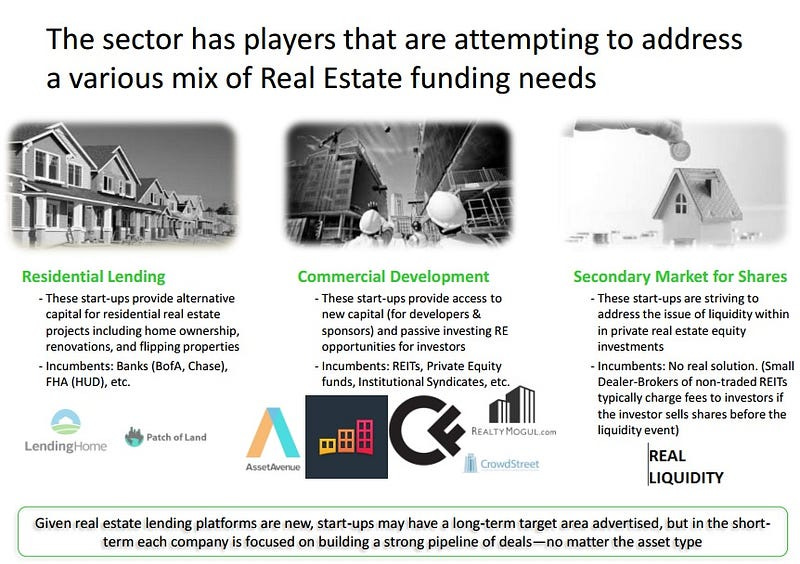What’s a REIT?
I was first introduced to real estate focused investment vehicles in the summer of 2007. It was the Independence Day weekend and I was on a road trip with my family to see my grandparents. I had just returned home from New York with a job offer from BMO Capital Markets to join the equity research team that covered REITs. I also brought with me a few examples of research that the team had published and on this trip I had informed my family that I would be focused on reading and learn what the hell a REIT was. Although the dense technical writing on the state of Non-traded REITs did quickly put me to slumber that afternoon drive, my tenure as an equity analyst space did express to me the value of having access to the $15 trillion asset class.
Case for Real Estate Crowdfunding
I thought the access REITs provided would long be the most democratic method in which a person could find investments. However, over the past four years thanks to the rise of crowdfunding, the lack of short-term capital, and changes in the regulatory environment there is a new and more promising way for an investor (accredited or non-accredited) through real estate crowd-funding portals. Real Estate in the United States has been a business that has historically been exclusive to a small number of individuals. These portals will serve as viable alternatives for investors, who were prior limited to public/private REIT investing options or limited properties. Crowdfunding portals also provided a quicker and more efficient capital raise option for real estate developers, who are currently limited to capital options from lenders that have long and arduous underwriting processes.
Market Opportunities
The CREtech startups that are entering the crowdfunding platform space are looking to take advantages of the market trends caused by the intersection of real estate, banking, technology, and public sectors:
Stale banking practices: Many banks and financial institutions follow underwriting guidelines that do not meet the needs of bridge loans for small to medium-sized real estate developments
Advantages of crowdfunding: Peer to Peer marketplaces use tech to make loans simple & fast; seamless technology also reduces lead times need by banks for closing deals
Access for passive real estate investors: Crowdfunding provides diversification and insider access to private transactions that were historically limited to personal network
These factors and more are why the real estate crowdfunding space has gained popularity among investors and entrepreneurs. The industry is expected to grow to $2.5 in 2015 from $1B in 2014. The growth potential and regulatory changes also are key proof points to why research house, Massolution expects the number of new entrants will increase by 100 before 2016.
Market Challenges
All players in this market will face similar challenges with respect to regulation, deal flow constraints, and lack of awareness from the real estate community.
Regulatory Changes: Although the JOBS Act opened the opportunity for a “democratization” of equity, there are still regulatory pressures that limit a larger investor pool; successful start-ups need to be well versed in the regulation to take advantage of the opportunity
Necessary network for the deal pipeline: Tech enabled services have usually disrupted industries by leveraging their “outside perspective.” However in RE space, one obstacle is breaking into the network. For startups to create value in this industry, they need to provide good deal flow and, therefore, need a strong network in the industry
Lack of awareness from established real estate community: Sponsors and Investors may lack awareness of RE crowdfunding platforms; it’s something new and current real estate professionals might not understand the use case for lending platforms
Startups Attempt to Address 3 Real Estate Funding Areas
The graphic below displays the three areas in which startups are attempting to provide value within the real estate fundraising sector. There have been more deals conducted within the residential and commercial development areas. But as the industry grows, there will be a need be more startups that allow investors to sell their shares/positions from crowdfunding in the secondary market.
Key Factors that will Determine Success in Real Estate Crowdfunding
The best bets within this nascent and competitive landscape will need to will need to show signs of the following:
Management expertise and track record that mitigate the challenges of the market: Team consists of real estate professionals and experienced technology focused entrepreneurs
Business model that takes advantage of the market changes: Crowdfunding platform decreases time associated with traditional lending/equity institutions and provides flexibility not seen in traditional real estate funds
One company that I think has done a great job of displaying these success factors is Fundrise:
I believe that this space will be very profitable and then years from now we will see real estate crowdfunding portals as micro-REITs that investors will go to based on the platform’s expertise in a specific region or asset class.
For a more in-depth report on the outlook of real estate crowdfunding portals please see the Massoultion report on crowdsourcing.org.
Earnest Sweat is a Venture Partner and Startup Advisor of One Traction. Sweat sources, manages and mentors startups within the fintech, edtech, and real estate tech sectors.






